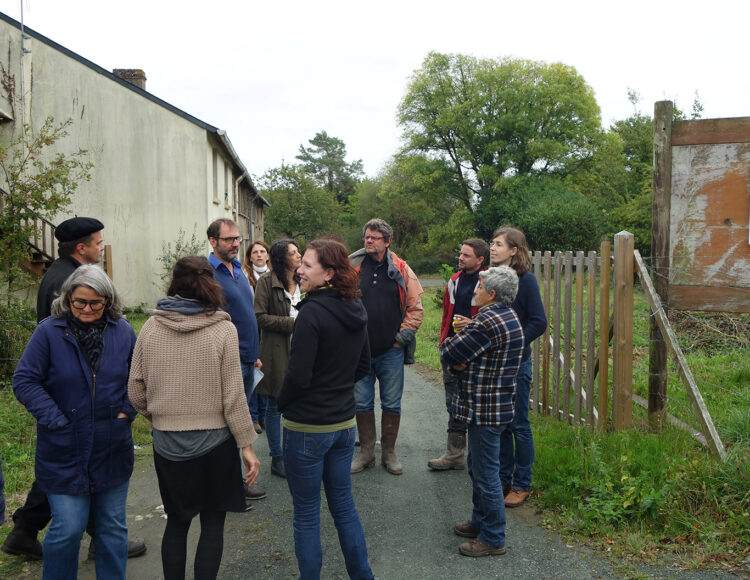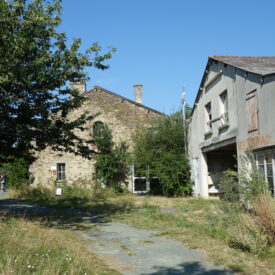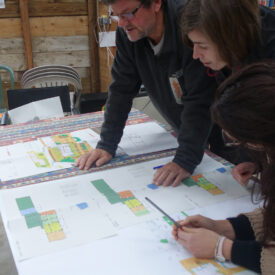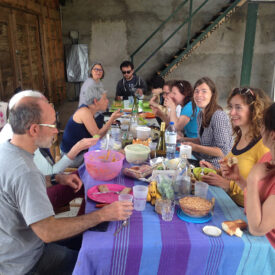Diane Morel is a graphic designer who’s behind many of Housing Europe’s publications, including all our Yearbooks for many years now. When talking to her about the production of our 2019 Yearbook, she shared her excitement of being part of a co-housing project that is currently being developed in Fay-de-Bretagne, half an hour away from Nantes. We’ve asked Diane to share with us her personal story of a life transition into co-housing within the CasaNoé residents’ cooperative.
Interview: Michalis Goudis
What made you think of doing the transition to a co-housing project?
At the very beginning, my partner and I wanted to start some kind of transition… He had just lost his job, and it was a good moment for changes. For many reasons, we wanted to get out of a system we found was not so good anymore. We wanted to find a new way of life, in which we would have more time for our two children, more time to make things ourselves, to spend less money, to learn things and hopefully, to be a bit happier overall. We then thought of selling our house, which is located in the countryside, but quite near a big city, Nantes. And we had in mind to buy something else further away from the city, with more land, so that we could be a bit more autonomous, where we could grow our fruit and vegetables, maybe have animals and why not even produce our own energy… But we were afraid of feeling isolated, being away from our friends and families, and a bit cut-off from the rest of the world, in general.
One day, a friend of ours suggested attending a conference about co-housing, organised by a local association, the “Conseil de Développement d’Erdre et Gesvres”. We were immediately really interested in the concept. After that, we went to visit a completed co-housing project, near Nantes. That was a true revelation! It was exactly what we needed, it was the answer to all our questions! Collaboration! This was how it was meant to be. You cannot do much alone, but as part of a group, it becomes much easier, and nicer!
What are the most important characteristics, in your view, of sharing the living/communal space(s) with others?
As I said, we first came to this from an ecological point of view. Sharing spaces and objects means spending less energy, less money… In our group, we have the will to share a lot. We aim to share a common room for parties and meals, a co-working space, a workshop, a playroom for children, the garden with vegetables, fruit, hens. We also think about sharing some cars, and organising ourselves to even share the burden of food shopping. But since we started to really work on the project, it became evident: this project does not just mean sharing spaces and services, it means so much more! It means creating a community, united by a common vision, in which everybody will have to find their own place, to be able to express themselves… A group in which everybody should feel good.
How has your practical experience setting up the project been so far?
We started our reflexion about 2 years ago now. We were lucky (again, compared to other similar projects) as we found quite quickly a place to buy. We bought in July 2019 a big piece of land (1.5 hectare), with old buildings to renovate. We have been working with architects for 4 months now, the plans will soon be ready. Renovation work should start this summer. This is for the operational part…
Because really, the most important, and most difficult part to deal with, is the human part. A co-housing project is not just an architectural project, a building for several families with some private spaces and shared spaces. It is a real human adventure. We all know how relationships with others are: we sometimes get along well, and sometimes we disagree, argue. It cannot be always perfect, we cannot agree all the times. And it works like this for every human group: couples, families, friends, neighbours, work team… In a cooperative housing as well! And we already had to experiment it.
Since we started, we already had 3 different groups: some people attented reunions with us for several months, then left, for different reasons (it was not the right time, their couple split, disagreement on how we worked…).
In particular, we had twice the case of people having strong demands on ecological issues. They had very high goals on this (which is very good), but when somebody didn’t agree with their vision, they would’nt easily question it or accept someonelse’s opinion… Those people finally left the group, because discussion turned to be too difficult. It was sad moments, we felt a bit defeated, for not having been able to solve the problems. But those experiences were also good, they teached us a lot.
We now know that what is the most important for us is the community. If we share common values and visions, if we are united, if the group is stable, and everybody feels right in his or her place in it, then everything becomes possible together! We can argue, discuss, convince each other when needed, or just respect someone else’s opinion without wanting to change it, and go further together. At the contrary, if the group doesn’t work well, with a bad role distribution, with dominating people, then you can put all ecological and philosophical theory on it, it will never works.
So this is the big challenge: really take care of the group, find tools to communicate properly and express disagreements or tensions before they turn into anger. And obviously, it is very important to enjoy the good moments together, meals, parties, games, moments to laugh and smile, enjoying the simple pleasure to spend time together!
We are now 7 families, ready to go, and eager to live together! The only pity is we’ll still have to wait about 2 years, time to finish renovation work…



